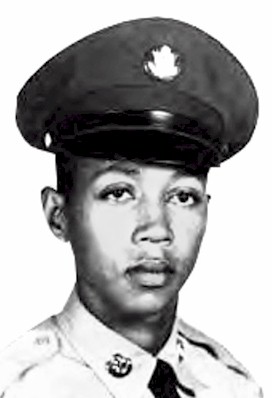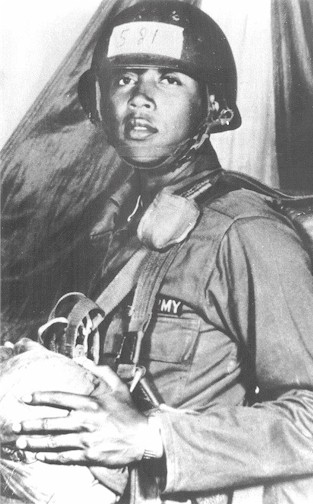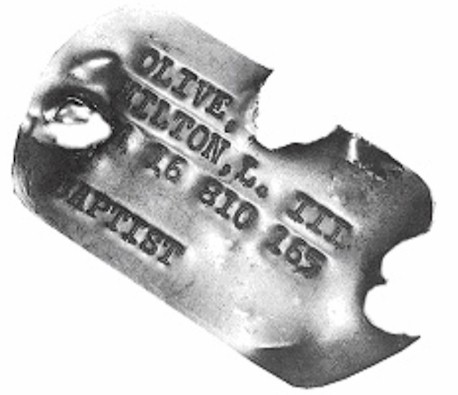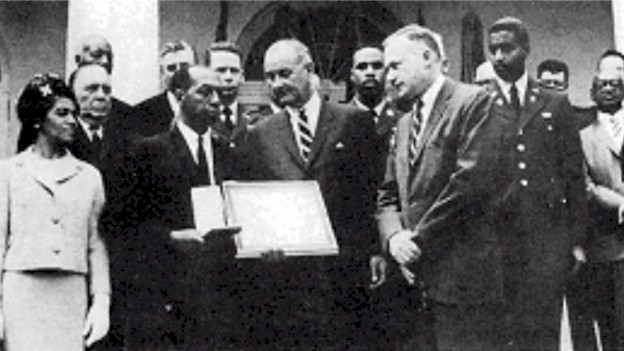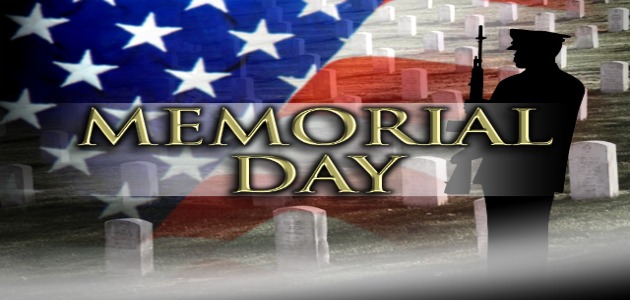
Good Morning POU!
Today is Memorial Day and this week we will feature African American soldiers awarded the highest military honor, the Medal of Honor. This is our second feature of military heroes. You can revisit the first series by searching “Medal of Honor” on our homepage.
Milton Olive III
When one Black boy came into this world in Chicago on November 7, 1946, it was a day of mixed emotions for Milton Olive, Jr. The newborn child was Milton and Clara Lee Olive’s first child. He was also destined to be their last; Clara Lee died four hours giving birth to a new life. The third generation in a line of Milton Olives, that infant was given his mother’s middle name, becoming Milton Lee Olive, III. Throughout his life however, he would become affectionately known to his family, and years later to his comrades in the Army, as “Skipper” or “Skip”.
For Milton Olive, Jr., the news on that day went from bad to worse. Not only had he lost his young wife, the prognosis for the survival of his infant son did not bode well. Doctors gave him little chance of surviving more than one or two days. But the under-weight, fragile little boy fought for life with a resolve that belied his scrawny frame. He survived those first critical days and was soon released from the hospital to the South Side Chicago home where he would grow up, with periodic visits to live with his grandparents in Mississippi.
Skipper was never a South Side Chicago hard-case like many of the young boys who had to grow up in what was often a rough side of the city. Rather, he was a quiet kid, never hanging out with neighborhood toughs or seeking trouble. That rather placid personality however, was never misunderstood as a character weakness by those who knew him. Skipper was a scrapper when circumstances demanded it; his very survival against a gloomy medical prognosis had demonstrated this vividly.
Even in those early, formative years after his birth, Skipper’s health was always a matter of concern. “It wasn’t until he was in the first or second grade that we began to quit worrying, and realized he would survive,” recalled Barbara Penelton, his aunt, during a recent interview.
After Skipper’s birth, his father relied heavily upon his extended family to help him raise the young boy. Many of Skipper’s early years were spent living with relatives in Chicago or with his grandparents on their farm in Lexington, Mississippi. Then, when Skipper was ten years old, his father married Antoinette Mainor, a teacher in a Chicago public school, and young Milton moved home to live with his father and step-mother.
In contrast to his infancy where he had battled simply for life, in adolescence Skipper enjoyed a rather comfortable home life. His father doted on his only son and, unlike so many poor Black families who lived in the South, could afford to cater to his son’s whims and desires. “He got new bicycles for his birthday and cameras for Christmas,” wrote Don Terry in a 2002 Chicago Tribune story about the man who became a local hero. “At family gatherings, when his cousins were dressed in jeans and t-shirts, he was often decked out in a suit that matched his dad’s.
“Olive loved taking photographs with his father, who made a few extra bucks snapping newlyweds and church picnics. Stuck inside the pages of his (Skipper’s) Bible was a business card his father had made for him years earlier: Milton Olive III, Chicago’s Only 12-year-old Professional Photographer.”
Miles away from Chicago, Skipper had a “second-family” in Mississippi, and during his summer school vacations he frequently returned to his grandparent’s farm. When he was ready to begin high school Skipper opted to remain on the farm. For the next two years he attended an all-Black school that was an extension of a local Pentecostal church.
While living in Mississippi Skipper could not help but become intimately aware of the glaring disparity between the rights and opportunities afforded to White men and women as opposed to their Black American counterparts. He was quickly caught up in the Civil Rights movement. During the summer between his freshman and sophomore years some 200,000 civil rights advocates marched on Washington, D.C., to hear Dr. Martin Luther King deliver his famous “Dream Speech.” As he began his sophomore year trouble continued to broil in the South. On September 13, 1963, a bomb exploded at the Sixteenth Street Baptist Church in Birmingham, Alabama, a key site of many civil rights organizational meetings. The explosion killed four young girls: Denise McNair, Cynthia Wesley, Carole Robertson, and Addie Mae Collins, who were attending Sunday School that morning. The tragedy prompted immediate riots in Birmingham that resulted in the death of two more young Blacks.
On January 23, 1964, while Skipper was mid-way through his second high school year, the requisite three-fourths of the 50 United States ratified the 24th Amendment to the U.S. Constitution that had passed the Congress a year and a half earlier. While that amendment said NOTHING about the rights of Black Americans, it was in fact a sweeping reform. The Amendment reads simply:
“The right of citizens of the United States to vote in any primary or other election for President or Vice President, for electors for President or Vice President, or for Senator or Representative in Congress, shall not be denied or abridged by the United States or any State by reason of failure to pay poll tax or other tax.”
Poll Taxes had been enacted in eleven Southern states after Reconstruction as a measure to prevent poor people, who included the vast majority of Southern Blacks as well as poverty-stricken and uneducated White people, from voting. While the Poll Tax violated a provision of the 14th Amendment insuring “equal protection under the law”, and despite having been found unconstitutional by the U.S. Supreme Court, at the time the 24thAmendment was ratified FIVE southern states (Virginia, Alabama, Texas, Arkansas, and Mississippi) still used the illegal tax as a means of silencing the voice of their Black and poor White populations.
Ratification of the 24th Amendment could not have occurred at a more opportune time. For two years the Congress on Racial Equality (CORE), the Student Non-Violent Coordinating Committee (SNCC), and the Nacional Association for the Advancement of Colored People (NAACP) had struggled to strengthen the political voice of Black Americans in the South through organized voter registration drives. The three diverse organizations found strength in uniting under the umbrella of the Council of Federated Organizations (COFO), and in September 1963 sponsored a highly successful election experiment in Mississippi. The Freedom Vote was intended to illustrate the desire of Missippi’s poor black population to be involved in the political process. More than 90,000 of them voted in a mock election pitting candidates of an unofficial Freedom Party against the official State Party Candidates. It set the stage for a turbulent, but historic change in the tide of the Southern political process over the next year in a stirring, and often dangerous, clammor for civil rights that caught up young Skipper Olive in its enthusiasm.
Skipper became one of 3,000 students who attended one of the 50 “Mississippi Freedom Schools” as part of the Mississippi Project led by COFO in an effort to educate the state’s Black population about their rights, and their potential to change their society by making their voices heard at the polls. Though these youths were too young to vote, (in the election of 1964 the National age for voting rights was 21), COFO concentrated largely on 10th, 11th, and 12th grade students.
When the traditional school year ended in the Spring of 1964 the Mississippi project evolved into a massive voter registration campaign that was called the Freedom Summer Project. It was an effort in which Skipper was an ardent supporter and active participant. As project volunteers spread out across Mississippi to visit Black homes and register new voters, they needed “guides” to help them get around the largely rural, poor Southern Communities. Skipper became one of those guides, despite the danger of escalating violence.
The violence was in fact, both real and extreme. On June 21, 1964, Michael Schwerner and Andrew Goodman, two White student civil rights activists who had come to Mississippi from Northern colleges for the summer project disappeared. Along with them was a local CORE volunteer, a young Black man much like Skipper Olive and only 4 years his senior, James Chaney. Though the three men’s bodies went undiscovered until August 4, it was an immediate certainty after their disappearance that the three men had been murdered.
In retaliation against the Freedom Summer Project, during June, July, and August Mississippi’s most ardent segregationists and white supremacists burned 37 Black churchs and the homes or businesses of 30 Black families. More than 1,000 CORE volunteers, many of them white students from Northern universities, were arrested; 80 volunteers were viciously beaten.
While the violence could not deter Skipper from his new-found mission in life, it certainly became a concern for his grandmother. Because the young man refused to quit his volunteer duties with the Mississippi Project, Grandma Olive sent him back to his father in Chicago with the comment, “He’s going to get killed, and get us killed.” Her fears were not unfounded; the violence of that hot summer in Mississippi often spilled over to destroy the family of those who sought to change America at the voting booth.
When Skipper returned to his father’s home he was much like many 17 year old boys, both Black and White, of any generation; shiftless, uncertain about his future, and still seeking to find himself. His father sought to provide guidance by offering Skipper three alternatives. The young man could either go back to school (in Chicago), get a job and go to work, or join the military.
Initially Skipper opted to return to school. When he attempted to enroll for his Junior year at Chicago’s Highland High School however, he learned that some of the credits he had earned during his first two years in a Mississippi Pentecostal High School would not transfer. At Highland High he would not be an upper classman scheduled to graduate in 1966. Rather he would have to repeat much of his Sophomore year.
Discouraged, Skipper then turned to his father’s second option. Quickly he learned that there were few jobs available to a 17-year-old Black boy who did not have a high school diploma. Before considering the third alternative, Skipper borrowed money from a cousin and took a train back to Mississippi to rejoin the Mississippi Project. Shortly after his arrival word reach his grandmother that Skipper was back, living temporarily with a school employee and continuing his dangerous activities in the civil rights movement.
The chain of events that wound up sending Skipper BACK to Chicago left him feeling both disappointed in himself and embarassed in front of his family. He had dropped out of school, joined a growing but not always popular civil rights revolution, failed to find a job, and bounced back and forth from one family member to another. At last, shortly before his 18th birthday, Milton Lee Olive, III, decided to prove he could do something positive. With a cousin he joined the United States Army.
Further determined to prove his worth, Skipper applied for jump school in order to become a paratrooper. He was proud of his uniform, wearing it regularly when he came home on leave, and was doubly proud of his jump wings. Writing home to the family he noted, “You said I was crazy for joining up. Well, I’ve gone you one better. I’m now an official U.S. Army Paratrooper. How does that grab you? I’ve made six jumps already.”
On June 5, 1965, one month after the Sky Soldiers arrived at Bien Hoa Airfield, Private First Class Milton Olive joined the 173d Airborne in Vietnam. Within a month he earned his first Purple Heart when he was wounded in action, an incident he hid from his family in order to spare them undue concern for his safety. Already back home there were subtle but divisive whispers about the wisdom of Skipper’s father having sent his only son off to war. Milton Olive, Jr., indeed had to question his own wisdom in that action. In his defense, it was of little comfort to him to point out that when he had offered his son that option, there was no real war in Vietnam and few Americans even knew that the Southeast Asian country existed.
Private First Class Olive was a good Sky Soldier and well liked. His somewhat cerubic countenance, his quiet demeanor, and his tendency to avoid brash and vulgar language made him stand apart. Combined with Skipper’s propensity to constantly quote scripture, in Vietnam he earned a second nickname. The men of Bravo Company’s third platoon often called him “Preacher.”
Though Skipper made it a point NOT to communicate things that would worry his family, such as the wound that had earned him a Purple Heart, he wrote home regularly and not only to his father and step-mother, but to his cousins as well. Early in October he sent a letter to the farm in Mississippi in which he wrote, “Grandma, please send me some cookies.” In a letter penned later that same month he wrote a poignant line reveling much of what he felt about life in the war zone. “We all do a man’s job and wear a man’s clothes and call ourselves men,” he noted, “but some of us are still little boys.”
Even as Skipper wrote those words, a package with the previously requested cookies was on its way to Vietnam. They would not arrive in time. Weeks later when the unopened package was returned by the Postal Service to the farm in Mississippi, it was a traumatic moment for an aging grandmother whose heart had already been broken.
Early on the morning of October 22 Army helicopters inserted Bravo Company at the edge of the dense jungle outside Phu Cong. Quickly the heavily-loaded troopers fanned out in a sweep towards the hidden enemy. The enemy did not remain hidden for very long. Amid a hail of gunfire that for a time pinned down the platoon, one of Skippers buddies was killed. The “little boys” of 3d platoon had little time to grieve the loss of their comrade. There was still a man’s job to be done. Attacking into the jungle, they drove the enemy backward and into retreat.
As the enemy withdrew backward into the jungle, Lieutenant Jimmy Stanford rallied his men to give chase. Following their leader, Platoon Sergeant Vince Yrineo and three men of the 3d platoon gave chase. The three were John “Hop” Foster, a 19-year old Black private from Pittsburgh, Pennsylvania; 20-year old Private Lionel Hubbard, a Black kid from Brownfield, Texas, and Private First Class Milton Lee Olive, III.
As the five soldiers pursued the fleeing enemy they suddenly found themselves racing into an ambush. An enemy bullet crashed into Foster’s steel pot and glanced downward to draw blood above his eye. “How bad is it?” he shouted above the din of battle to his nearby comrade.
“You’ll live,” Milton Olive shouted back with a grin as he continued to rake the hidden enemy with his rifle. The smile quickly vanished and Skipper shouted again, “Look out, Lieutenant, grenade!”
All five members of 3d platoon were in a tight perimeter and the enemy explosive might well have cost all five men their lives–but for the subsequent actions of an 18-year old boy from Chicago. Quickly Milton Olive reached out to grasp the deadly orb, hugging it to his body and then falling on top of it. It exploded almost immediately, tossing the slender paratrooper’s body into the air and flipping him over on his back. Red blood flowed from the multiple wounds of a shattered Black body, but four men survived and continued to battle the hidden enemy. Before the contact was broken Stanford, Yrineo, Hubbard, and Foster were all wounded. But all four men survived to return home, raise families, and to never forget they had been spared by the sacrifice of a comrade.
“It was the most incredible display of selfless bravery I ever witnessed,” the platoon commander later told a journalist.
On April 21, 1966, the elder Milton Olive and his wife Antoinette were honored guests at the White House. On that day President Lyndon Johnson read a citation detailing the heroic acts of their son just six months earlier, while Lieutenant Jimmy Stanford and Private John Foster looked on. Then, with Chicago Mayor Richard Daly, members of Skipper’s extended family, and other dignitaries gathered for the somber but impressive ceremony, President Johnson presented Milton Olive the Medal of Honor posthumously earned by his only son. In that moment, Milton Lee Skipper Olive, III, became the first Black soldier of the Vietnam War, and the third Black American since the Spanish-American War, to receive his nation’s highest honor. He was also the first Black American in history to be awarded the Medal for actions performed while serving in a non-segregated Army combat unit.
Before the ceremony concluded the President read a letter, revealing for the first time the text of a letter Skipper’s father had sent the President upon receiving word that his son would receive the Medal of Honor. Milton Olive, Jr., had written:
“Our only child and only grandchild gave his last full measure of devotion on an international battlefield 10,000 miles from home. It is our dream and prayer that some day the Asiatics, the Europeans, the Israelites, the Africans, the Australians, the Latins, and the Americans can all live in One-World. It is our hope that in our own country the Klansmen, the Negroes, the Hebrews, and the Catholics will sit down together in the common purpose of good will and dedication; that the moral and creative intelligence of our united people will pick up the chalice of wisdom and place it upon the mountain top of human integrity; that all mankind, from all the earth, shall resolve ‘to study war no more’.”
In his death, Milton Olive III has become an inspiration to many of his fellow Chicagoans, who have further commemorated this Medal of Honor winner’s life and courage by naming a junior college, a park, and a portion of the McCormick Place Convention Center after the young African-American soldier.
Courtesy of The Defining Generation


